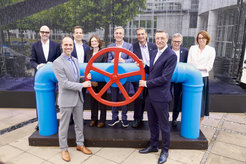Max Planck Campus Mainz Launched: Focus on Liquids, Soft Matter, and Earth System Research
New research alliance sets impulses for interdisciplinary science and vibrant campus life
With a symbolic gesture — the turning of a giant water wheel — the Rhineland-Palatinate Minister of Science Clemens Hoch and Max Planck Society President Patrick Cramer officially launched the Max Planck Campus Mainz and the Max Planck Liquids Initiative on July 8, 2025, at the Max Planck Institute for Polymer Research. Among the well-wishers were also the Mayor of Mainz, Nino Haase, and the Vice President of Johannes Gutenberg University Mainz (JGU), Stefan Müller-Stach.
The Max Planck Campus Mainz encompasses the existing Max Planck Institutes for Polymer Research and for Chemistry, the Max Planck Graduate Center in collaboration with JGU, and the newly established Max Planck Liquids Initiative. This initiative focuses on aqueous systems and their complex chemical processes, using experimental, theoretical, and simulation-based approaches.

(from left to right): Henner Rolvien (Axthelm Rolvien Architects), Minister of Science Clemens Hoch, Mayor Nino Haase, Prof. Tanja Weil (MPIP), Prof. Mischa Bonn (MPIP), JGU Vice President Prof. Stefan Müller-Stach, MPG President Prof. Patrick Cramer, Prof. Jos Lelieveld (MPIC), and Prof. Frauke Gräter (MPIP).
The properties of water in focus
The Liquids Initiative connects various scientific disciplines: from researchers using quantum simulations to study atoms and molecules, to scientists modeling the Earth’s climate system. It builds a thematic bridge between the molecular fundamentals of water and global challenges such as climate change and water scarcity. At its core is the question of how water behaves on the level of individual molecules and in the interaction of many molecules at the nanometer scale.
"Through the study of water’s unique properties, we hope to drive technological innovation. For example, precisely designed nanopores in membranes could make water desalination more energy-efficient, and interfacial water at catalysts could improve photocatalytic hydrogen production." says Mischa Bonn, Director at the Max Planck Institute for Polymer Research and head of the Max Planck Liquids Initiative.
The overarching goal of the campus and the initiative is to create a leading center for fundamental research in the fields of liquids, soft matter, and Earth system sciences through interdisciplinary collaboration and international networking.
Patrick Cramer explains: “In Mainz, we are embarking on something significant: The Liquids Initiative will unlock insights into water and aqueous solutions at the nanoscale — a scientifically complex yet long-overdue endeavor, since water is our planet’s most important resource and one of the most pressing topics for the future. At the same time, our institutes are growing closer together through the Max Planck Campus, especially with the construction of the new Paul Crutzen Center for Theoretical Studies.”
Hoch adds: “The Max Planck Society has long been a reliable partner in Rhineland-Palatinate, working together with our universities and research institutions to strengthen fundamental research and its transfer into application. The partnership in Mainz between the two Max Planck Institutes and JGU exemplifies the potential of such collaboration. The Max Planck Campus and the Liquids Initiative contribute directly to this effort and will further enhance Mainz’s international visibility as a scientific hub. That is why the state is supporting the initiative with more than 40 million euros.”
Max Planck Campus strengthens Mainz as a research location
Scientifically, the Max Planck Campus is set to become a leading center for fundamental research in liquids, soft matter, Earth system science, and related chemical processes. Strengthening the scientific, technical, and organizational links between institutes will enhance the location’s appeal to young researchers and top talents from around the world. It will also deepen the collaboration with JGU in teaching, research, and infrastructure. A model example is the long-standing Max Planck Graduate Center, which plays a vital role in the education and development of young researchers.
A foundation for a more sustainable future: The Liquids Initiative Mainz
The new Liquids Initiative connects research themes across the two Max Planck Institutes and is jointly funded by the state of Rhineland-Palatinate and the Max Planck Society. In the long term, this initiative could lead to the establishment of a third Max Planck Institute in Mainz.
In addition to the Liquids Initiative, further scientific and infrastructural developments are planned to continue expanding and strengthening the campus. These include the foundation of the Paul Crutzen Center for Theoretical Studies, a hub for big data analytics, artificial intelligence, and machine learning. These new facilities will complement existing ones and generate new momentum for interdisciplinary research and a vibrant campus life.
Scientific background: The exceptional behavior of water
Water exhibits unique physical and chemical properties compared to other liquids, primarily due to its strong hydrogen bonding. The research of the Liquids Initiative will focus on phenomena such as water’s anomalous phase behavior (solid, liquid, gas), its variable viscosity, and its ability to spontaneously dissociate into ions (H⁺ and OH⁻), known as autoionization.
These nanoscale phenomena govern fundamental processes within the Earth system — and by extension, our climate — many of which remain poorly understood. They determine phase transitions between vapor, liquid, and ice; regulate energy flows within the ocean-atmosphere system; and influence aerosol-cloud interactions, where nanoparticles serve as condensation nuclei that affect Earth’s radiation balance and precipitation patterns.
Funding
The state of Rhineland-Palatinate has pledged special funding of up to €42.6 million for the initiative. Of this, nearly €27 million will go toward constructing a new building, alongside initial funding for a scientific department for up to ten years.
The Max Planck Society, specifically the MPI for Polymer Research, will contribute approximately €6 million annually for personnel, scientific infrastructure, and operational costs.
Timeline
In 2026, the appointment of a Max Planck Director for the Theory of Liquids is planned. Starting in 2027, construction will begin on the building that will house the Liquids Initiative and the Paul Crutzen Center for Theoretical Studies.Completion is targeted for 2029.












